THE BLACKENING (2022)
Seven friends go away for the weekend and end up trapped in a cabin with a killer who has a vendetta.
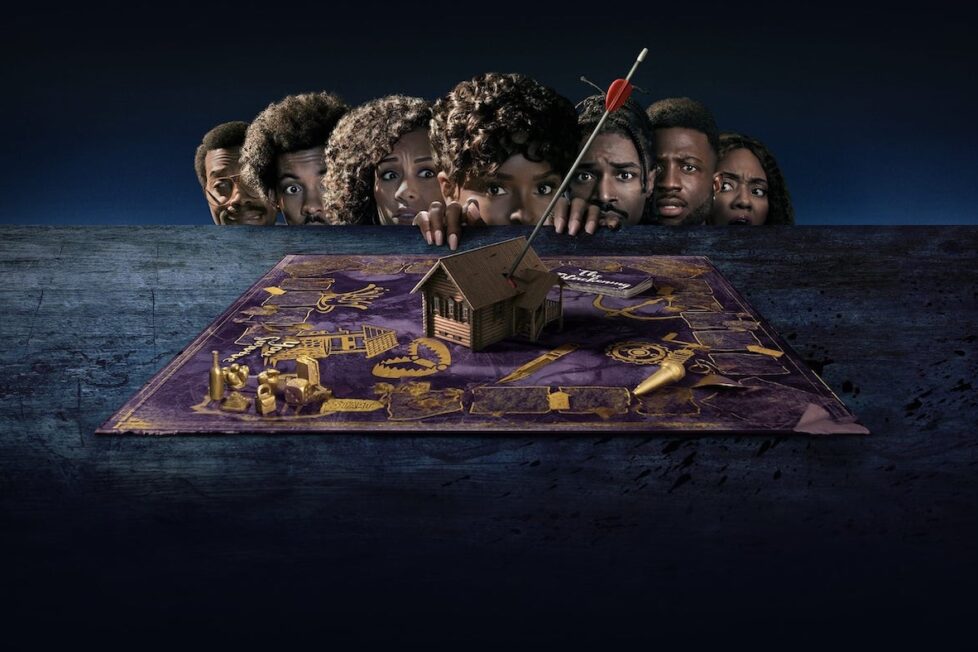
Seven friends go away for the weekend and end up trapped in a cabin with a killer who has a vendetta.


Upon release, Scream (1996) was praised by critics for its masterful recontextualising of horror conventions. With an intelligent combination of self-aware comedy and suspense, Wes Craven reinvigorated the genre and made something refreshing and captivating. For The Blackening, screenwriters Dewayne Perkins (Brooklyn Nine-Nine) and Tracy Oliver (Girl’s Trip) adopt a similar formula in attempting to deconstruct the genre through a Black cultural lens. While mocking genre conventions and cultural stereotypes, director Tim Story (Shaft) satirises the unwritten horror trope that the Black character always dies first. The Blackening is an ingeniously conceived satire of race and culture that examines what ‘Blackness’ truly means.
Taking place over Juneteenth weekend, Shawn (Jay Pharaoh) and Morgan (Yvonne Orji) rent a cabin in the woods to celebrate a reunion with their friends. But after the couple stumbles inside an ominous room in the basement, they discover a mysterious board called ‘The Blackening’. When the racist caricature in the middle of the board starts talking, the curious pair decide to play the game… where the objective is to answer trivia questions about Black people in history and pop culture. However, if they fail to answer the questions correctly, lives are at risk.
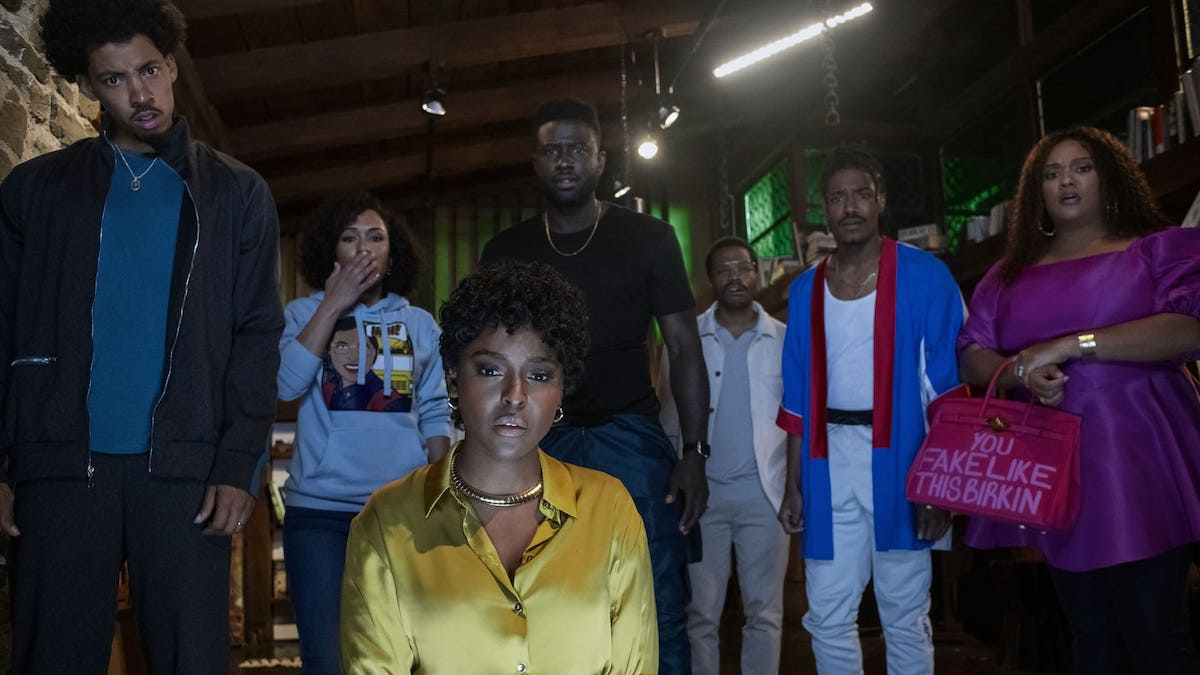
Eventually, the remaining members of the group arrive at the isolated cabin for the weekend getaway: Lisa (Antoinette Robinson) and her secret boyfriend Nnamdi (Sinqua Walls), Dewayne (Dewayne Perkins), Alison (Grace Byers), King (Melvin Gregg), Shanika (X Mayo), and Clifton (Jermaine Fowler). Unaware that Shawn and Morgan have vanished, the group continue the celebrations by drinking alcohol and playing card games… until, following a blackout, they too find ‘The Blackening’ board game. Suddenly, a menacing figure appears on a TV and warns them that if they refuse to play the game… they’ll die. Having to rely on their street smarts to stay alive, their predicament triggers introspection about their beliefs on race and identity.
With a large cast so consistently good, it’s tough to single out the key players. However, the loudest characters with the biggest personalities stand out the most. Dwayne Perkins (Brooklyn Nine-Nine) is on incredible form as flamboyant homosexual Dewayne. He deploys his sharp and witty dialogue strategically to help differentiate his character beyond the ‘Gay Best Friend’ archetype. Perhaps because he wrote and performed in both the original sketch and the screenplay, the actor seems finely attuned to the rhythm and nuances of the material.
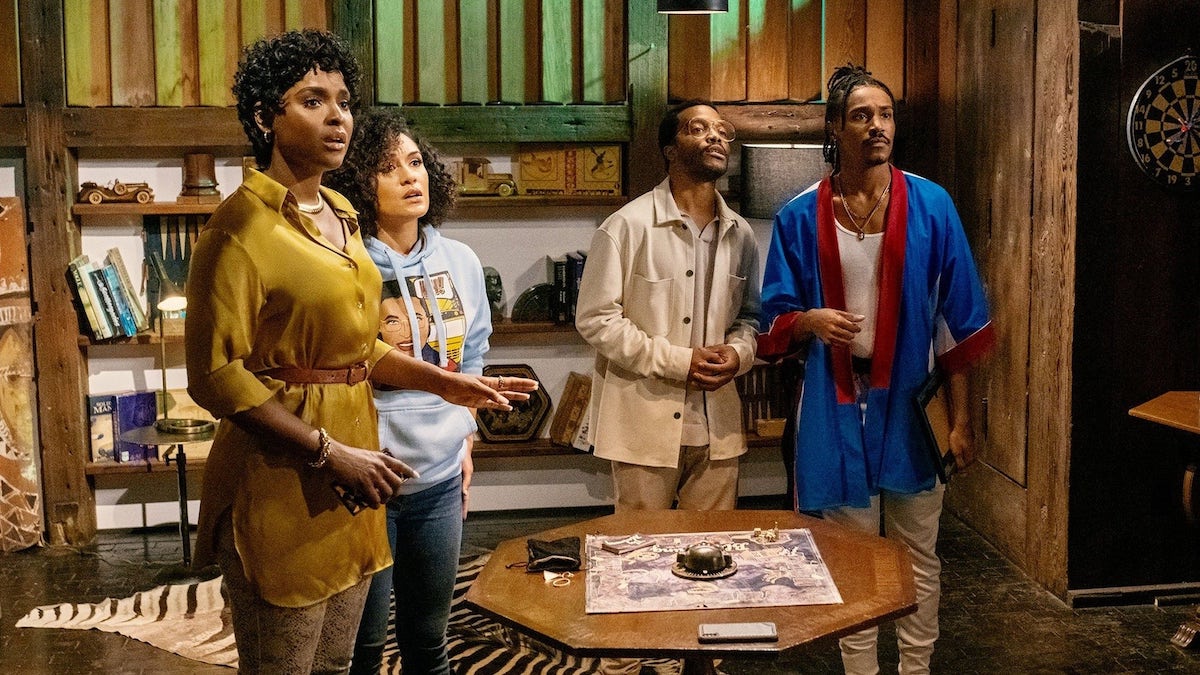
Additionally, Jermaine Fowler (Coming 2 America) is another major standout and chews the scenery as the group nerd, Clifton. With his exaggerated expressions, awkward mannerisms, and oversized glasses, the actor oddly resembles Steve Urkel from the sitcom Family Matters (1989-1998). Clifton initially appears as an innocuous geek fixated on the superiority of Android over the iPhone, but as the only Republican amongst a group of Liberals, he comes to resemble a nerd from hell.
Based on a short devised by co-writers Perkins and Tracy Oliver (Girl’s Trip), The Blackening unapologetically skewered horror tropes and lampooned the unwritten rule that Black characters always die first. It presented a scenario in which a group of campers barricade themselves inside a cabin while being pursued by a serial killer. The victims argue amongst themselves about who’s truly the Blackest while downplaying their ethnicity to survive. It was a single joke premise but the ingenious conceit upended both genre cliches and cultural stereotypes for plenty of inspired laughs. While The Blackening is underpinned by the same excellent concept, director Tim Story elongates the sketch and transforms it into a feature-length film that lacks the consistent kinetic energy and absurdism of the original. The story does successfully transition between scenes of murderous thrills and amusing satire, but there’s a sense an overextended 90-minute runtime isn’t achievable.
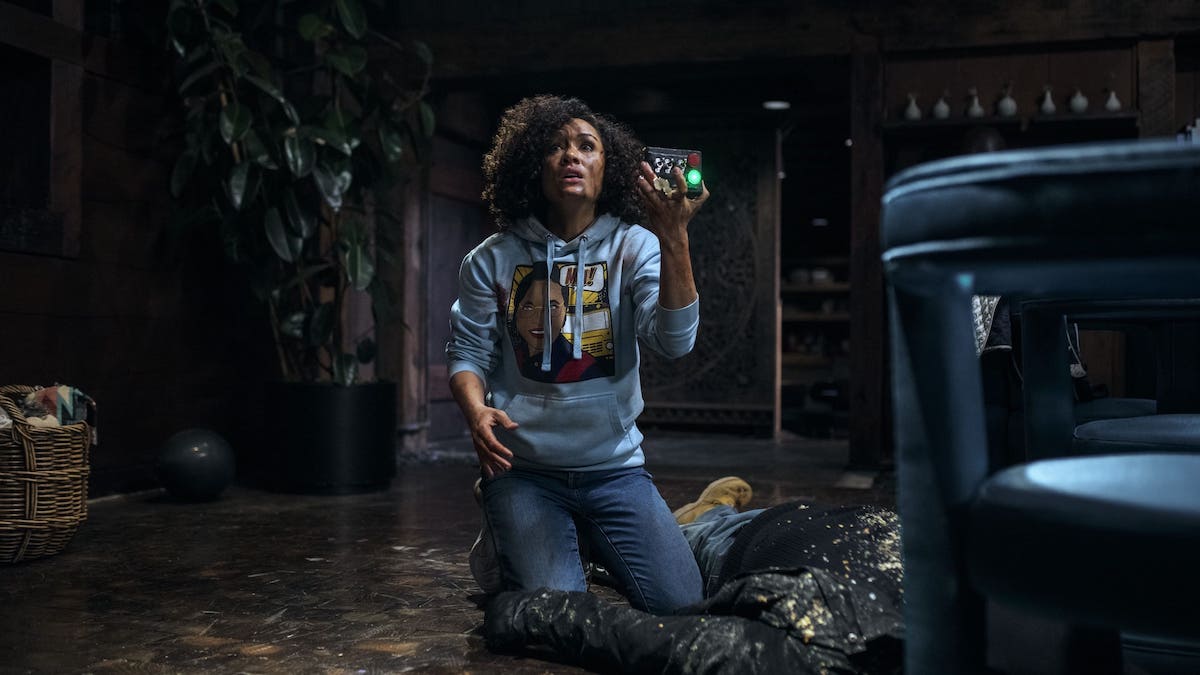
It’s an arduous task adapting a comedy sketch and expanding it into a format with such different requirements. With true vision, a short film can be overflowing with potential and accommodate a larger cinematic endeavour, but while Story provides a blend of social commentary and satire, he generates horror with all the verve and grace that he brought to his earlier works like Fantastic Four (2004) and Tom and Jerry (2021).
The Blackening relishes the opportunity to wink at slashers such as Scream 2 (1997) and I Know What You Did Last Summer (1997) but never reaches those same levels of ruthlessness. After the opening prologue, the script is surprisingly reluctant to kill anyone. The primary menacing device is a board game with a racist caricature asking questions designed for people to quantify their Blackness, but that concept is under-utilised and forgotten entirely after the first act.
Despite mentioning The Texas Chain Saw Massacre (1974), The Blackening feels more reminiscent of Scary Movie (2000). Perkins and Oliver’s screenplay retains a similar slapstick spirit but sizzles with comic self-awareness. Its freshness derives from the highly specific comedic details that satirise the community’s experience of living with a heightened sense of danger and overused observations surrounding Black culture. In one of the more amusing sequences, a character’s handing of an automatic pistol is corrected from the ineffective sideways style to the traditional upright method that allows the gunman to aim efficiently. Even better is when several characters encounter Ranger White (Diedrich Bader) during their daring escape, who, in an attempt to alleviate their fears, insists “I’m one of the good ones.” Followed by unleashing the ludicrous disclaimer “You can trust me, seriously. If I got an invite to the cookout, I’d be honoured, but I wouldn’t go. I know my presence in that black space would be a disturbance.”
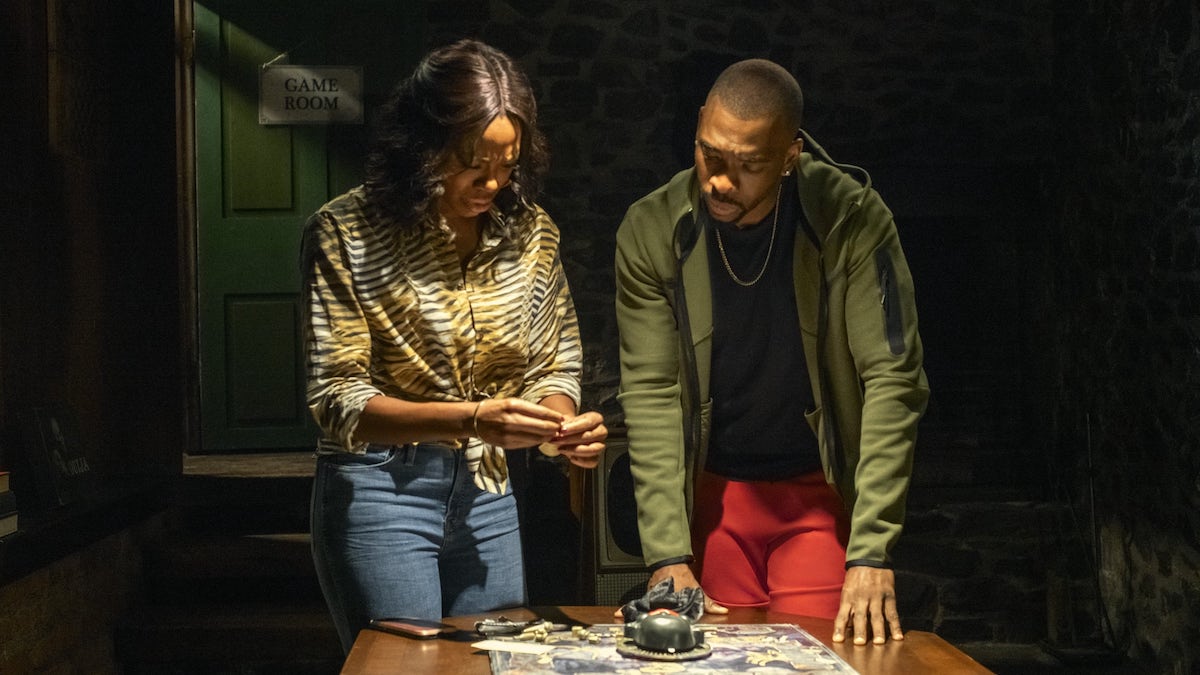
There are plenty of funny moments watching the characters sharpen their senses with a potent combination of MDMA and Adderall. However, The Blackening isn’t always as funny as intended. Audiences unfamiliar with Black culture, contemporary political discourse, and horror cinema may not recognise many references. Alongside a recurring gag about the psychic capabilities of two close girlfriends rooted in their Black sisterhood, many outdated jokes land in the most milquetoast middle ground imaginable.
One round of the titular board game challenges the group to answer: “How many seasons does The Fresh Prince of Bel-Air have a dark skin, Aunt Viv?” Another question asked is: “How many Black characters were on the TV show Friends?” These moments relieve tension but would’ve worked better during the 1990s when both shows were relevant. Regardless, Perkins and Oliver manage to keep the laughs flowing steadily while exploring more sociocultural themes than most horror spoofs ever aspire to.
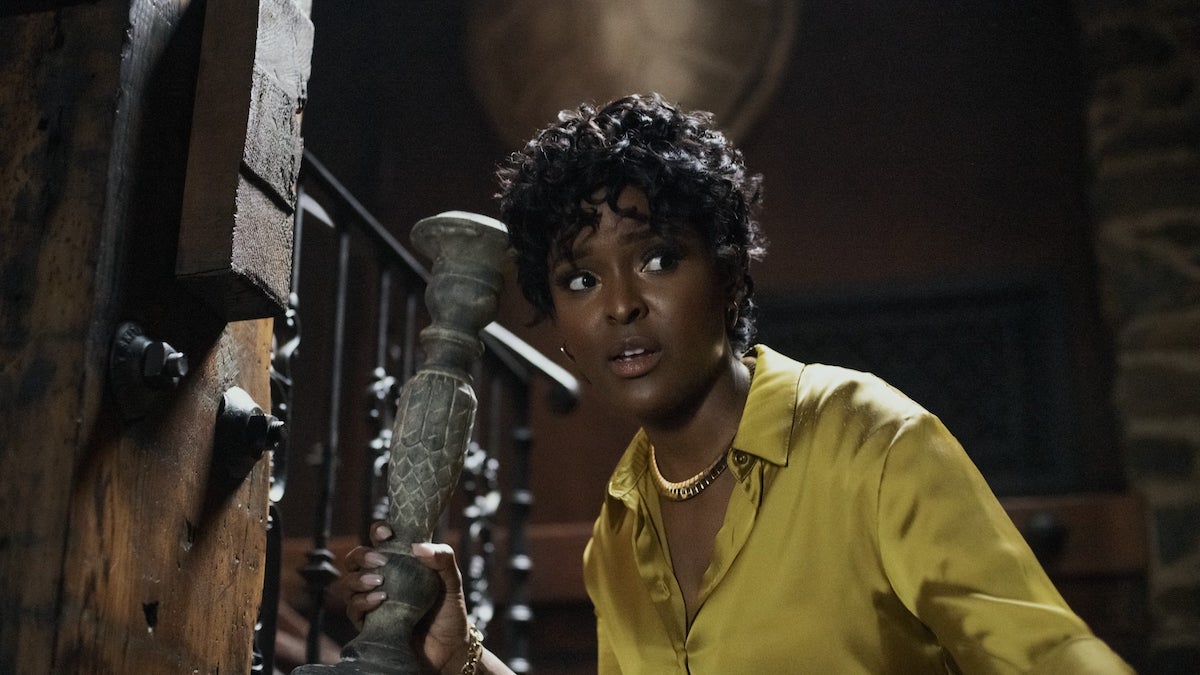
With a thought-provoking exploration of racism, identity, and the consequences of prejudice, The Blackening doesn’t compromise its poignant message entirely for cheap laughs. The comedic tone successfully disarms audiences and makes us more susceptible to the subtext within. Through conversations and questions, Story sharply examines the definition of Black identity and interracial behaviour that imperils Black communities. Clifton is used to representing the nuanced relationship amongst the community as the character debates “Who’s the blackest?” The group instantly became weary of him because he’s a Republican who voted for Donald Trump twice. After admitting Beyonce’s Super Bowl performance made him feel unsafe, the group becomes horrified and immediately questions whether he’s Black. Although the vehicle that presents these themes is somewhat lighthearted, the serious issues surrounding Black identity deserve the audience’s consideration. Despite society’s attempt to define what it means to be Black, there is no singular definition. It operates on a spectrum and intra-community discrimination can be harmful to those disconnected from their culture.
Although The Blackening isn’t as successful as it might have been, it has more positives than negatives. The dense script is full of self-referential humour, poignant social commentary, and a central conceit that requires all of these elements to exist together. There’s just so much to mine from deconstructing tropes that affect Black characters in horror. Unfortunately, Tim Story doesn’t commit to the horror wholeheartedly, so the concept feels undercooked. Instead of exploring the ingenious premise further, The Blackening becomes as predictable as the slashers it satirises. Regardless, the incredible chemistry between the cast keeps everything afloat and generates plenty of laughs throughout its brisk runtime.
USA | 2022 | 97 MINUTES | 2:39:1 | COLOUR | ENGLISH

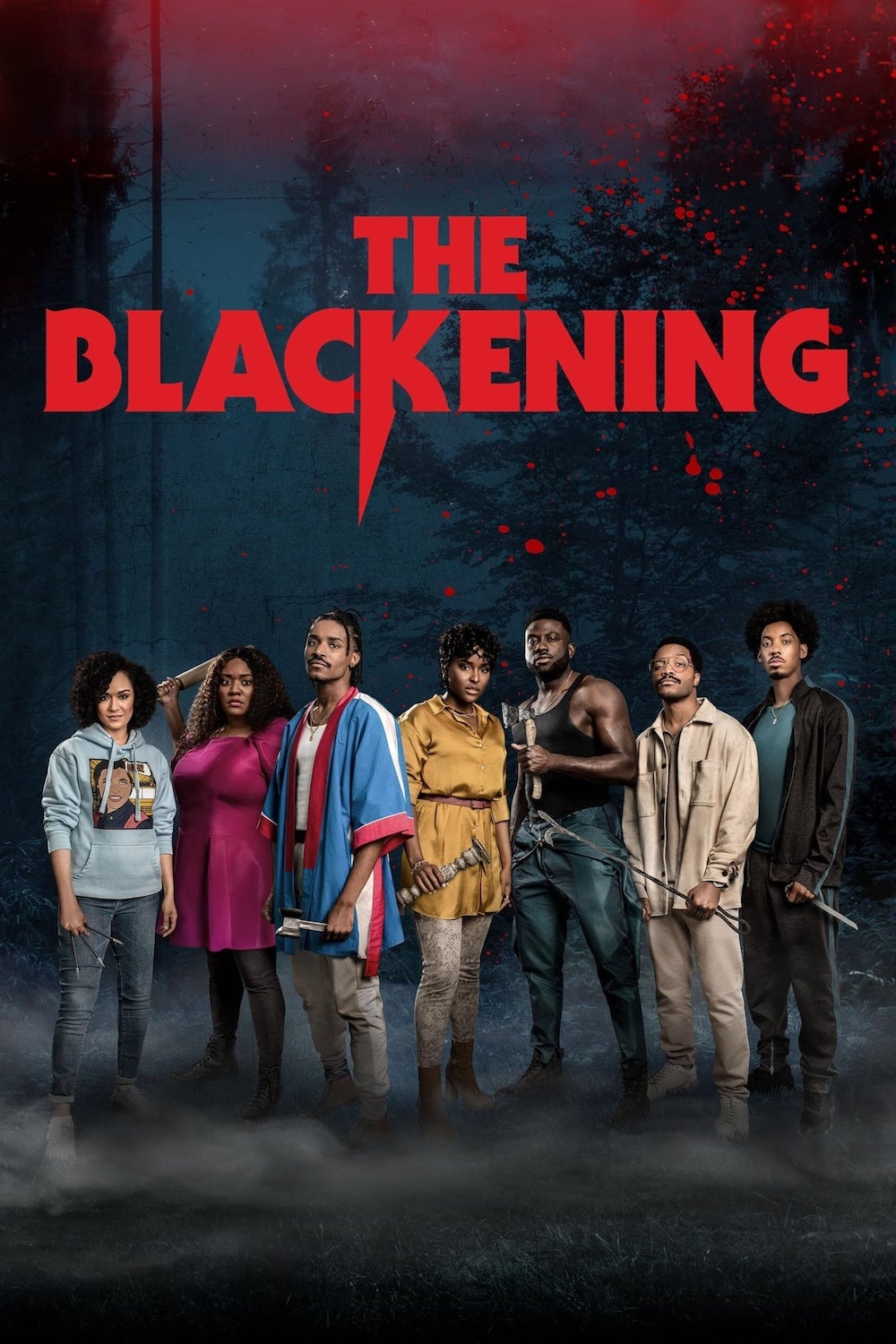
director: Tim Story.
writers: Dewayne Perkins & Tracy Oliver (based on the short ‘The Blackening’ by 3Peat).
starring: Jermaine Fowler, Dewayne Perkins, Antionette Robinson, Sinqua Walls, Melvin Gregg & X Mayo.
